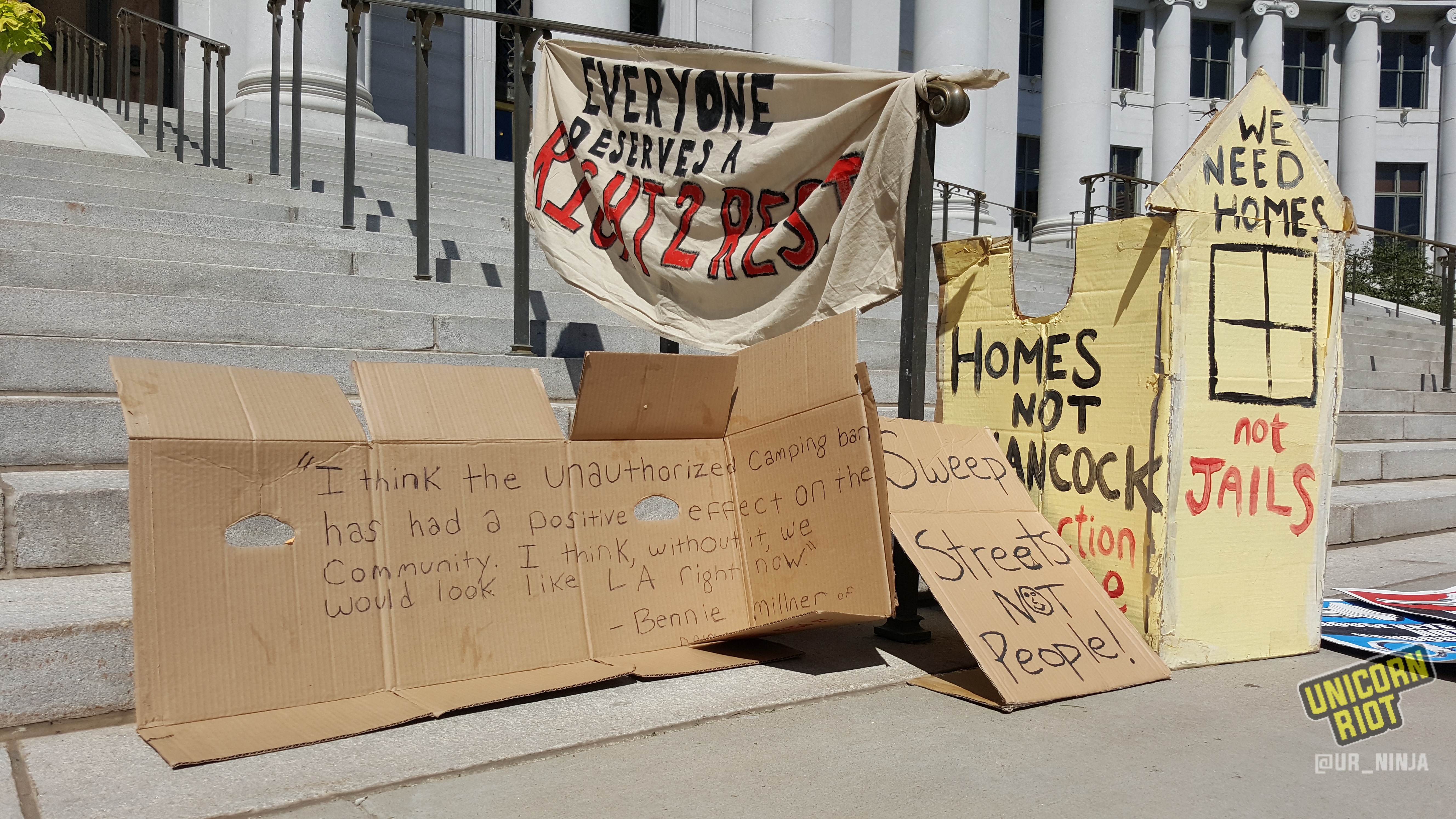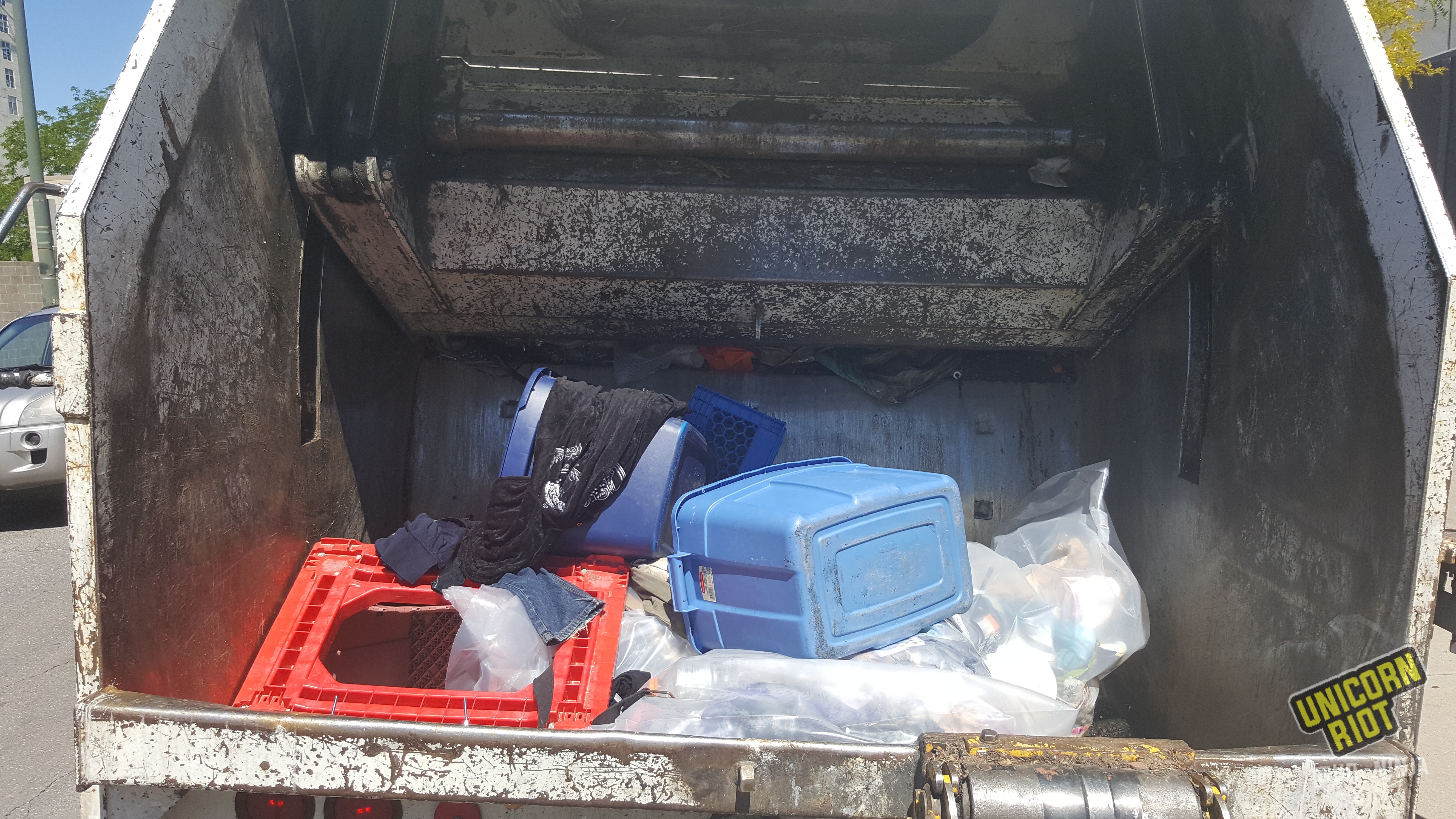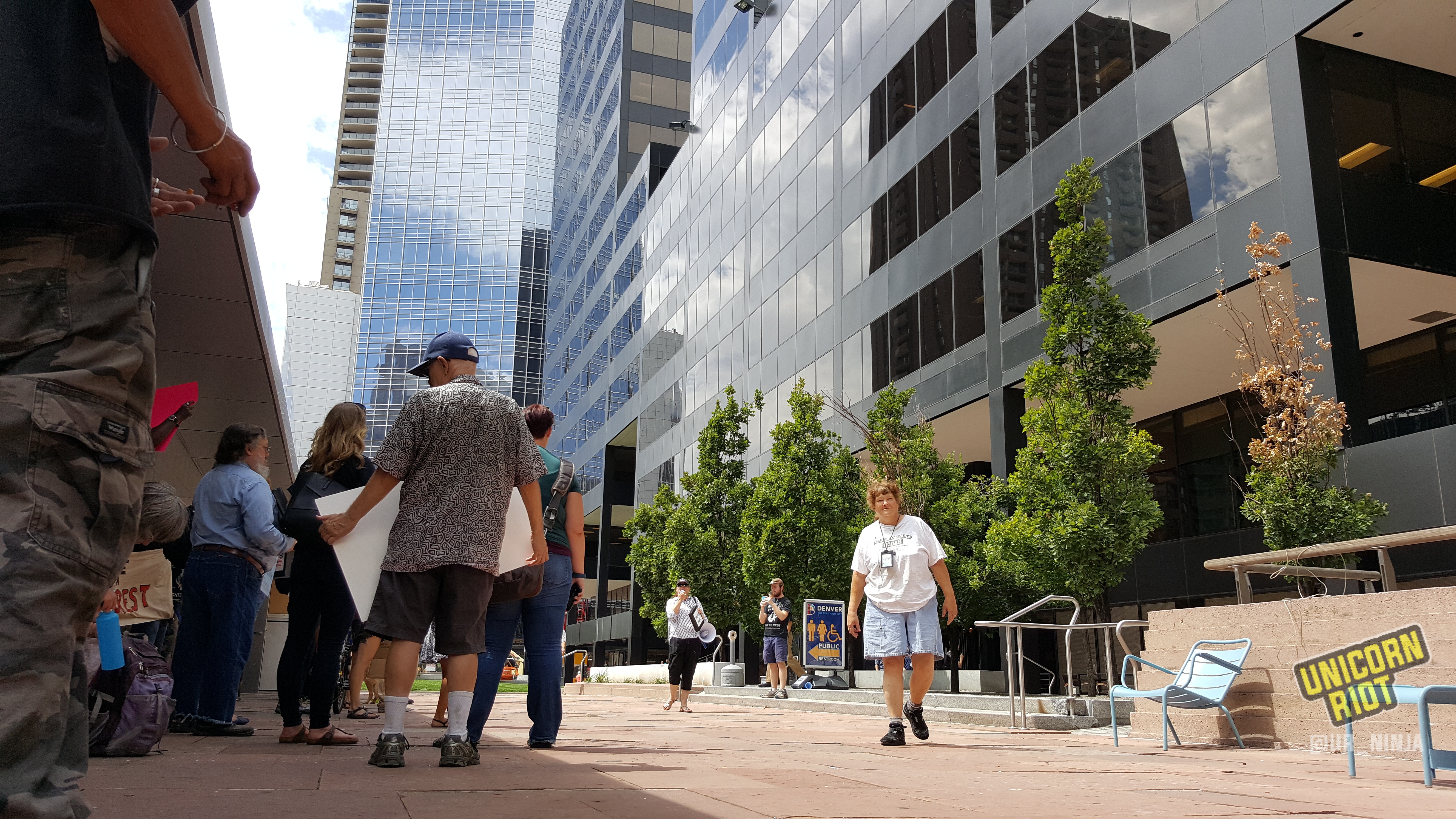Class-Action Lawsuit Against Denver: Motions Filed for Summary Judgement
Denver, CO – On Monday morning, August 14, 2017, Denver Homeless Out Loud, along with other advocacy groups and lawyers, held a press conference outside the Denver City and County Building (City Hall) to shed light on new developments in the class-action lawsuit against the city of Denver for violating the constitutional rights of unhoused persons.
Jason Flores-Williams and Andy McNulty, who have been representing the plaintiff class pro-bono, submitted a motion for summary judgement (PDF) Monday morning to the United States District Court of Colorado, Judge William J. Martinez.
A motion for summary judgment asks the court to decide the case, before trial, in favor of the party making the motion. The party that files a motion for summary judgment is usually arguing that there is no material question of fact and that the opposing party cannot win under the law.
On Monday evening, the attorney’s representing the city of Denver also submitted a motion for summary judgement (PDF) to Judge Martinez. Therefore, both parties are hoping the Judge will rule in their favor considering all of the same evidence, prior to a trial.

This class-action lawsuit was filed almost a year ago on August 25, 2016. Amid the ongoing intensive pretrial work including exhaustive evidence discovery, the city continued violating unhoused person’s constitutional rights, through criminalization measures such as the Unauthorized Camping Ordinance (PDF), also known as the Urban Camping Ban, which effectively makes surviving without housing illegal.
On Friday, May 19, 2017, people living without housing in downtown Denver were approached by police and given the equivalent of eviction notices. They were told that the following Monday there was going to be a “sweep” of the area. (Unicorn Riot was live streaming during this sweep)
These sweeps consist of Denver police and public works, along with help from inmates, forcing people without housing to “move along” to somewhere else. The residents without housing are told to gather their belongings, and anything they can’t move immediately can be stored for them in a storage facility for 30 days. Any of their belongings that they aren’t able to move at that moment, and choose not to be stored, are thrown away (as pictured below).

The motion for summary judgement (PDF) is a 50-page document detailing all of the evidence which the plaintiff class’ lawyers believe should be more than enough to prove their case against Denver.
One piece of evidence is the huge sweep which happened on July 13, 2016 where,
Denver officials descended upon the homeless camped out of sight along the Platte River without notice and ordered them to leave the area, only allowing them to take the possessions that they could carry. . . Denver officials began burning Plaintiff Class Members’ remaining property with flame throwers. Afterwards, they held a barbeque at the site as the homeless individuals they had just forcefully evicted looked on.” – motion
With this motion for summary judgement, the plaintiff class and their lawyers more specifically,
ask that this Court enter summary judgment in their favor and for a summary judgment order from this Court holding: (1) Plaintiff Class Members’ Fourth Amendment rights were violated by Denver officials in accordance with Denver’s customs, policies, and practices; (2) Plaintiff Class Members’ Fourteenth Amendment Due Process rights were violated by Denver officials in accordance with Denver’s customs, policies, and practices; and (3) Plaintiff Class Members’ Fourteenth Amendment Equal Protection rights were violated by Denver officials in accordance with Denver’s customs, policies, and practices.
Plaintiff Class Members ask that this Court uphold that basic constitutional guarantees protect even the most disadvantaged United States citizens.” – motion
After the press conference Monday morning, advocates marched down the 16th Street Mall in Denver and stopped in front of the Downtown Denver Partnership (DDP) office. The DDP lobbied heavily for the Urban Camping Ban and for the criminalization of unhoused persons. They have also been an influential contributor to the gentrification and lack of affordable housing in the city.

According to the Partnership’s 2011-2012 Annual Report, “The Partnership helped lead the successful lobbying efforts to institute a city-wide unauthorized camping ban to address behaviors negatively affecting businesses and the Downtown environment.”
Tami Door, president and chief executive of the DDP, told the Denver Post in 2011:
There’s no question that we have serious concerns over the increased numbers of individuals on the streets. There are behaviors that aren’t acceptable and we need to explore ways in which we address these.”
However in another Denver Post article published in 2013, Tami Door expressed how the DDP is planning to help people who need affordable housing:
The Downtown Denver Partnership has developed formal strategies and goals to add as many as 18,000 affordable units to downtown by 2027.”
The track record of both Mayor Hancock and Tami Door are of prioritizing financial interests and the wealthiest of Denver’s population. Their definition of “affordable units,” is housing for people who can afford to pay over $1,200 per month in rent. To afford this average rental price in the Denver metro area, renters need to make $35 an hour, or almost 4.5 times Colorado’s minimum wage.
According to “The Self-Sufficiency Standard For Colorado 2015” report (PDF) by Colorado Center on Law and Policy, the cost of living across the state has outpaced wages by a ratio of 3:1 over the last 14 years.
If the present housing crisis is not remedied with truly affordable housing for people who make Colorado’s minimum wage of $9.30 an hour, even more people will be forced to live on the streets where they will be criminalized for existing, or will be forced to move out of Denver; which seems to be the city’s plan.
Another piece of evidence in the motion for summary judgment shows “the callousness and disdain with which Denver has treated its homeless residents. Denver police officers regularly shouted at homeless individuals that they are not welcome in Denver and should just leave town.”
Below are our livestream videos from Monday’s press conference and march.
https://vimeo.com/374857812
Unicorn Riot will continue coverage on the current targeting of Denver’s unhoused population, as well as the rise of Beloved Community Village, and will provide updates as they become available.
To help our volunteer-operated, horizontally-organized, non-profit media collective please consider a tax-deductible donation:
Previous Unicorn Riot coverage on Denver’s housing crisis:
- U.S. District Court of CO Certifies One of the Largest Houseless Class-Actions in U.S. History (April 29, 2017)
- Three Convicted in Camping Ban Trial Two Weeks Ahead of Right to Rest Act Hearing (April 18, 2017)
- Three Co-Defendants Fight Denver’s Camping Ban in Court (April 4, 2017)
- Third Push for Homeless Bill of Rights in Colorado Legislature (Feb. 24, 2017)
- With Mayor’s Approval, Denver Continues Survival Gear Confiscations (Dec. 16, 2016)
- Denver to Continue Confiscating Survival Gear of Unhoused Under Encumbrance Ordinance, to Stop Under Camping Ban (Dec. 11, 2016)
- Denver Intensifies Sweeps of Unhoused Community and Confiscates Survival Gear; Parade of Rights Rally (Dec. 4, 2016)
- First Hearing in Class-Action Against Denver for Violating Human Rights (Oct. 14, 2016)
- Class-Action Lawsuit Against Denver: Motion Filed for Recusal of Judge Shaffer (Sept. 22, 2016)
- People Without Housing File Lawsuit Against the City of Denver (Aug. 27, 2016)
- Denver’s Affordable Housing Displaces Low-Income Residents (June 20, 2016)
- SURJ Flash Action Disrupts Denver City Council (Jan. 26, 2016)
- City of Denver Cracks Down on its Homeless Community (Dec. 20, 2015)
- Homeless Forced Out of Tents and into Snowstorm by Denver Police (Dec. 16, 2015)
- Resurrection Village: Denver Police Destroy Tiny Homes and Arrest Builders (Oct. 27, 2015)



